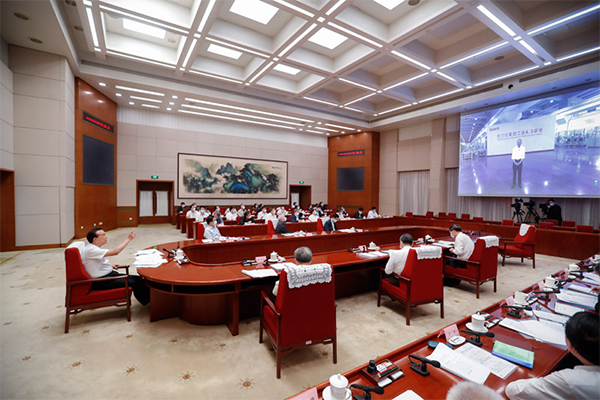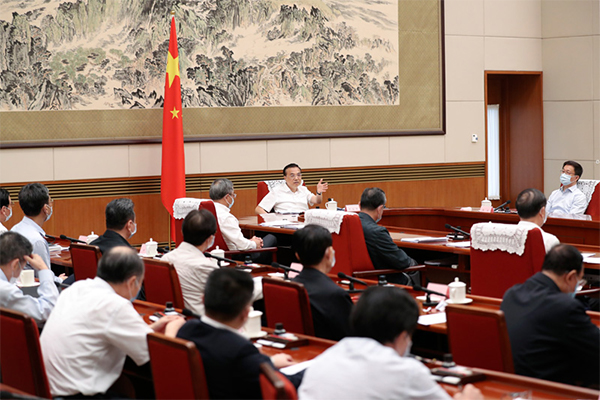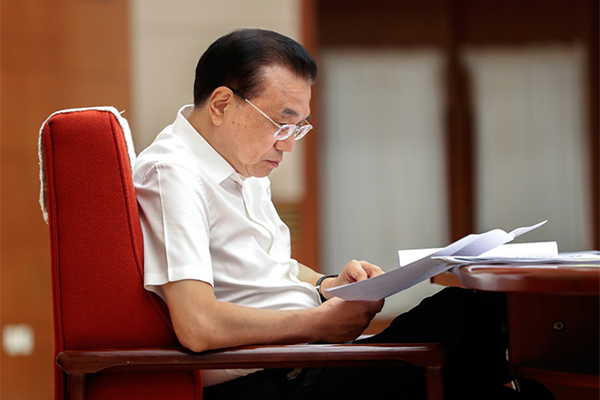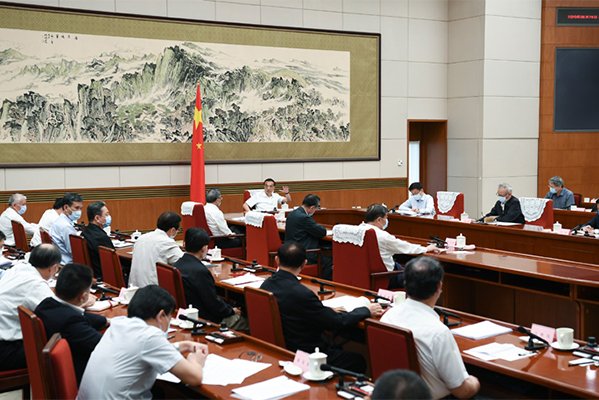Premier Li Keqiang chaired a symposium on foreign trade on June 28, with managers from six enterprises in the fields of home appliances, clothing, medical equipment, furniture, cross-border e-commerce platform and motorcycle joining via video link.
At the symposium, the Ministry of Commerce and the General Administration of Customs reported on the current situation of foreign trade and their plans; managers from the enterprises briefed those at the symposium on their situation in operations, exports and imports.

What changes happened to your orders? Were there any job cuts? Could supply chains be guaranteed? Premier Li inquired before asking for their opinions on market situations and State policies, and urged related departments to help them through the difficult time.
“As the nation is deeply integrated into the world economy, which is mired in the pandemic and deep recession, it requires cooperation among all parties to stabilize the fundamentals of foreign investment and trade,” the Premier said.
Key to economy, employment

According to the Premier, stabilizing the fundamentals of foreign investment and trade is the key to the overall picture of the economy and employment, as it has created more than 180 million jobs in direct or indirect ways.
Foreign trade has started to pick up in recent months thanks to targeted support measures for promoting resumption of work and production and ensuring epidemic prevention and control, Premier Li said.
While COVID-19 is still spreading worldwide and the world economy is in deep recession, China is facing a complicated environment in foreign trade as the nation is deeply integrated into the world economy, Premier Li said, adding that China should be fully prepared for the challenges.
He urged related departments to survey the changes in foreign trade, especially in major industries in foreign trade, in terms of securing employment, people’s livelihoods and market entities.
Concerted efforts must be made to ensure six priorities and six fronts with firm confidence in development, Premier Li said, adding that the nation should eye a higher level of opening-up, make innovations in foreign trade and promote stable and qualified foreign trade to ensure employment and economic development.
More support for micro, small and medium-sized businesses, labor-intensive and large-sized backbone foreign trade enterprises

Premier Li stressed the importance of fully carrying out policies laid out in the Government Work Report to support enterprises, secure employment, people’s livelihoods and market entities.
Along with efforts to expand domestic demand, the government should also come up with new measures to stabilize the fundamentals of foreign trade and investment, the Premier added.
"Support should be given particularly to micro, small and medium-sized businesses, labor-intensive enterprises and help large-sized backbone foreign trade enterprises to solve problems," he said.
China's manufacturing sector sees a large proportion of labor-intensive industries, such as textile, luggage and plastic products, so the export decline in these industries will have a direct impact on employment, the Premier said.
Since large-sized backbone foreign trade enterprises have contributed considerably to exports, it matters a lot for ensuring employment and people's livelihood, he added.
The Premier said more targeted measures will be introduced to ease corporate burdens of tax, fees and rising labor costs, in order to secure jobs.
Export tax rebates should be improved and made at a faster pace, Premier Li said.
Financial institutions should be guided to pull foreign trade firms out of liquidity problems through stronger financing support in the form of credit and guarantees, among others.
For better services to firms in the foreign trade sector, reforms should continue in customs clearance facilitation.
The Premier stressed aligning epidemic prevention and control measures with efforts to steady foreign trade and investment and vice versa, calling for enhanced communication and coordination with related countries, smooth channels for international freight, and more “fast-track lanes” facilitating the movement of business people.
Export-oriented firms should be encouraged to transform themselves in pursuit of higher product quality and higher value added.
The Premier also called for accelerated development of new business forms and patterns in the foreign trade sector, including cross-border e-commerce and online trading, diversified investment in building overseas warehouses, greater support for service platforms aimed at boosting exports of small and medium-sized enterprises, and cultivation of new growth drivers in the sector.
Improvements in measures for stabilizing foreign trade and investment should suit local conditions, he said.
Premier Li said foreign trade enterprises’ further involvement in the international market will force domestic products and services to upgrade in level and quality.
More measures to open up

With deepening opening-up in manufacturing, the country also will enlarge opening-up in the service industry, especially the high-end service sector, further build a market-oriented and internationalized business environment under the rule of law, and improve favorable, attractive policies for foreign investors, he said.
He also urged China’s central, western and northeast regions to increase their attraction in industrial transfer, and make more efforts to maintain stable industrial and supply chains.
Premier Li emphasized both market and government’s role in stabilizing the fundamentals of foreign trade and investment.